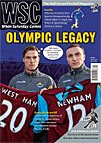 Paul Knott pays tribute to a player who came to symbolise a club, remaining instrumental through an era of unprecendented success
Paul Knott pays tribute to a player who came to symbolise a club, remaining instrumental through an era of unprecendented success
Nine seasons after joining Hull City from Cambridge Utd for exactly one-thousandth of the fee paid by Liverpool for Andy Carroll, Ian Ashbee moved on a free to Preston on January transfer deadline day. During this time he achieved the unique feat of captaining the same club in all four divisions, including the top one for the first time in Hull City’s history.
At the start of each of those nine eventful seasons, it became a ritual among Tigers fans to wonder whether Ashbee could cope with the step up following a promotion or retain his place in a team upgraded by summer signings. By the end of most of them, his habitual response was to carry a flagging promotion or relegation struggle virtually single-handedly over the finish line, usually topped off with a rare but crucial goal, such as the exquisite I-didn’t-know-he-could-do-that-sort-of-thing curler on the last day at Yeovil that sealed the 2004 promotion from League Two and got the journey underway after several false starts. Less eye-catching but perhaps even more important was his immense contribution to staving off relegation from the Championship in 2007, which laid the platform for the historic promotion to the top flight that followed.
The seasons when Ashbee missed the run-in generally coincided with the few years over the last decade when things did not turn out well. These were the times when he was away having his leg bolted together again – a limb the doctors discussed amputating at one stage when the thigh bone had “died” and stopped regenerating.
Ashbee’s overall indispensability was a reflection of his effect on individual games. Ashbee is a holding midfielder who is even less aesthetically pleasing than the average incumbent of the role. But whenever he was absent, the defence would suddenly look vulnerable and the attacking players less creative. Worse still, concentration and confidence would be mislaid and panic would set in under pressure. All of this would miraculously come flooding back when Ashbee returned to scuffle around the midfield.
His focus on the hard, unglamorous work meant that, despite Ashbee’s astonishing achievements, he was still sometimes under-appreciated by the less discerning among the Tigers following. Towards the end of his time at the club, he was becoming visibly exasperated with the moaners in the crowd and this ongoing spat took some of the shine off his recent return to the KC Stadium with Preston. Often, it has to be said, Ashbee’s critics were the Johnny-come-latelys who were baffled by City’s failure to win the European Cup straight after promotion to the Premier League and who lacked the diehards’ grounding in watching players who genuinely were not up to professional standard.
The majority of fans sensed in Ashbee’s departure the final curtain coming down on the club’s most successful ever era and some reacted emotionally to his being nudged out of the door. But based on cold calculation, letting him go made sense. At 34 and with his injury record, there cannot be many miles left on the clock. There had been talk of his dedication slipping recently upon finding himself at a loose end of an evening following some family problems. He was also on an inflated Premier League contract, although that should be offset against his rather more modest terms for most of his time at the club (reportedly £500 per week at the beginning). This was due to expire in the summer and was not going to be renewed by City, in the midst of rebuilding under new management and ownership. Preston, by contrast, offered an attractive 18-month deal.
Legend has become a cliched, overused word in football but for his part in leading a moribund club on an unprecedented rise from the bottom division to the top tier, overcoming some horrific injuries along the way, it seems fair comment in the case of Ian Ashbee. His modest skills when compared with Raich Carter or Ken Wagstaff mean that it has never sounded right to describe Ashbee as Hull City’s best ever player. But it is hard to argue with calling him the greatest in terms of achievement and influence.
Now that Ashbee has left town, the only trace of recognition is the Ashbee Burger on the menu in the Weir Bar, a footballers’ haunt in a smart suburb of Hull and the venue for most of the usual tales of their misbehaviour (real and imagined, invariably involving Jimmy Bullard). Fine and filling meal though it is, it seems an inadequate tribute. Some people are talking seriously about a statue. Time to start sculpting, I reckon.
From WSC 290 April 2011